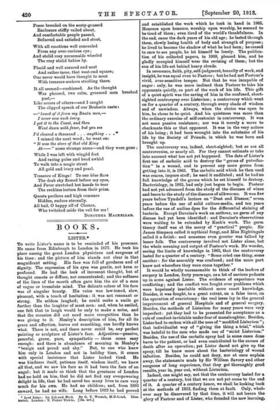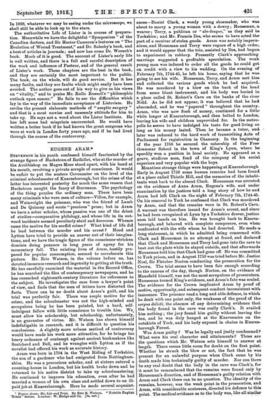BOOKS.
LISTER.*
To write Lister's name is to be reminded of his presence. He came from Edinburgh to London in 1877. He took his place among the great London physicians and surgeons of his time : and the picture of him stands out clear in that magnificent setting. His face was full of goodness and of dignity. The expression of his eyes was gentle, not keen or profound. He had the look of incessant thought, but of thought remote or diffuse, not concentrated; and the softness of the lines of the mouth often gave him the air of a man of vague or irresolute mind. The delicate colour of his face was of singular beauty. His voice was low-toned, slow, pleasant, with a touch of hesitation : it was not resonant or strong. He seldom laughed; he could make a smile go further than the laughter of most men : and, when he smiled, one felt that to laugh would be only to make a noise, and that the occasion did not need more recognition than he was giving to it. Henley's description of him, for all its grace and affection, leaves out something, one hardly knows what. There is not, and there never could be, any perfect painting or sculpture of Lister's face. Adjectives—pensive, peaceful, grave, pure, sympathetic — these come easy enough : and there is abundance of meaning in Henley's " benign and proud and shy." But, to one who knew him only in London and not in holiday time, it comes with special insistence that Lister looked tired. He was kindness itself, patience itself, wisdom itself; we knew all that, and we saw his face as it had been the face of an angel : but it mada us think that the greatness of London had no hold on him, that he did not find any overpowering delight in life, that he had saved too many lives to care very mach for his own. He had no children ; and, from 1893 onward, be had no wife. Long before 1893 he had proved • Lord Lister: his Life and Work. By G. T. Wrench, M.D.Lond. Illus- trated. London : T. Fisher Ernwin. [15e. net.]
and established the work which he took in hand in 1865. Honours upon honours, worship upon worship, he seemed to be tired of them ; even tired of the world's thankfulness. In the end, came the dark years of his old age; he lasted through them, slowly losing health of body and strength of purpose ; he lived to become the shadow of what he had been ; he ceased to care to see people, he let himself be lonely. The publica- tion of his collected papers, in 1909, pleased him, and he gladly occupied himself toyer the revising of them; but the sun of his life set behind heavy clouds.
In reverence, faith, pity, self-judgment, tenacity of work, and insight, he was equal even to Pasteur; but he had not Pasteur's vivid, over-sensitive temper. Not that he was incapable of anger : only, be was more inclined than Pasteur to take his opponents quietly, as part of the work of his life. This gift of a quiet spirit was the saving of him in the confused, short- sighted controversy over Listerism ; a controversy which went on for a quarter of a century, through every shade of wisdom and of unwisdom. Always, when the choice was open to him, he chose to be quiet. And his quietness was more than the ordinary exercise of self-restraint in controversy. It was not mere passive resistance ; nor was it merely a move to checkmate this or that opponent. It was in the very nature of his being ; it had been wrought into the substance of his life by the Society of Friends, in which he was born and brought up.
The controversy was, indeed, short-sighted; but so are all controversies, or nearly all. For they cannot estimate or take into account -what has not yet happened. The date of Lister's first use of carbolic acid to destroy the " germs of putrefac- tion" in a wound, and to prevent any more germs from getting into it, is 1865. The carbolic acid which he then used was coarse, impure stuff; he used it undiluted ; and he had no full knowledge of the germs which he set himself to destroy.
Bacteriology, in 1865, had only just begun to begin. Pasteur had not yet advanced from the study of the diseases of wines and beers to the study of the diseases of silkworms. It was five years before Tyndall's lecture on " Dust and Disease," seven years before the use of solid culture-media, and ten years before the use of aniline dyes for the differential staining of bacteria. Except Davaine's work on anthrax, no germ of any disease had yet been identified : and Davaine's observations were waiting to be extended by Koch's work. The germ theory itself was at the mercy of "practical" people. Sir James Simpson called it mythical fungi, and Miss Nightingale called it a fetish : and nonsense even greater was talked by lesser folk. The controversy involved not Lister alone, but the whole meaning and output of Pasteur's work. No wonder, seeing the limits of knowledge in 1865, that the controversy lasted for a quarter of a century. " Some cried one thing, some another : for the assembly was confused ; and the more part knew not wherefore they were come together."
It would be wholly unreasonable to think of the leaders of surgery in London, forty years ago, as a lot of envious pedants up in arms against Lister. The evidence of experience was conflicting ; and the conflict was fought over problems which were hopelessly insoluble without more exact knowledge.
Besides, it was fought, to a great extent, on a false issue, on the operation of ovariotomy : the real issue lay in the general improvement of general Hospitals and of general surgery.
Besides, the methods of Listerism for many years were very imperfect : yet they had to be presented for acceptance as a rule of conduct inviolable under fear of manslaughter. Besides, Lister had to reckon with all the uses of " modified Listeris Ea "; that individualist way of " giving the thing a trial," which was hateful to the men who made use of "strict Listerism."
Besides, the use of the carbolic spray had in some cases done harm to the patient, or had even contributed to the causes of death after an operation; yet Lister dared not give up the spray, till he knew more about the bacteriology of wound infection. Besides, be could not deny, nor at once explain away, the statements made by Sir William Savory and other surgeons of long experience, that they got thoroughly good results, year in, year out, without Listerism.
Indeed, one might say, not that the controversy lasted for a quarter of a century, but that we are not yet come to the end of it. A quarter of a century hence, we shall be looking back at the methods of 1913, finding them at fault. Only, what• ever may be discovered by that time, it will not lessen the glory of Pasteur and of Lister, who founded the new learning, In 1938, whatever we may be seeing under the microscope, we shall still be able to look up to the stare.
The authoritative Life of Lister is in course of prepara- tion. Meanwhile we have the delightful " Symposium " of the Canadian doctors, and Sir Hector Cameron's lectures on " The Evolution of Wound Treatment," and Dr. Saleeby's book, and a host of articles in journals ; and now has come Dr. Wrench's book. Much of it is good. The account of Lister's early life is well written, and there is a full and careful description of the work and influence of Pasteur, and of the general result of Lister's work. These chapters are the best in the book, and they are certainly the most important to the public. The book, on the whole, will do good service. But it has many faults, and they are faults which might easily have been avoided. The author goes out of his way to give us his views on " vitality," and to praise Mr. Rollo Russell's " philosophic outlook upon cancer." He fails to see the difficulties which lay in the way of the immediate acceptance of Listerism. He reviles the present elaborate methods of " aseptic surgery " and that is a most unwise and unseemly attitude for him to take up. He says not a word about the Lister Institute. He has left some bad misprints uncorrected. He would have written a better book if be had known the great surgeons who were at work in London forty years ago, and if he had lived through the course of the controversy.











































 Previous page
Previous page